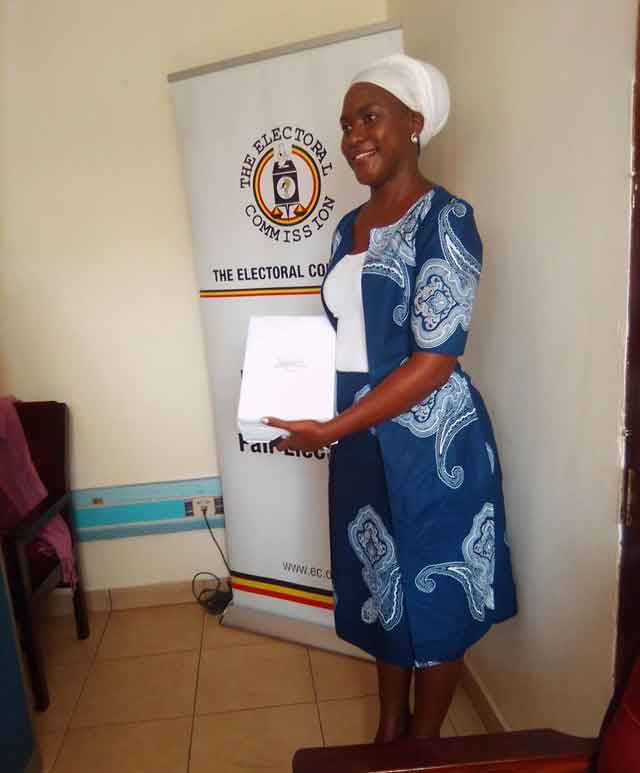
Kampala, Uganda | THE INDEPENDENT The number of persons aspiring to run for presidency continues to increase as the country prepares for the 2021 elections. It is emerging like in the past elections, fewer women have picked nomination forms to vie for Presidency.
The Electoral Commission Spokesperson, Paul Bukenya confirms that records at the Commission so far indicate that there are more male aspirants than females. Only five out of the fifty-five aspirants who have picked Presidential nomination papers are women.
They included 50-year old Maureen Kyalya who in 2016 was successfully nominated to contest in the race which then included President Yoweri Kaguta Museveni, Go Forward’s Amama Mbabazi, FDC’s, Dr. Kiiza Besigye and Elton Male Mabirizi.
The other female aspirants are: Dr. Nabatanzi alias Elizabeth Lugudde – Katwe. Lugudde – Katwe previously served as President’s Adviser on Special duties.
The latest female aspirants to pick the forms are thirty-two-year Phiona Mirembe, a lawyer by profession, Nancy Kalembe aged 39 and thirty-three-year-old Brenda Katushemererwe.
Kalembe says that Uganda needs to get ready for a female president because she believes that women can perform better since they will lead the country like mothers looking after their children in their homes.
While the country is under a multiparty dispensation, none of the registered Political parties have fronted a woman to vie for the highest office in the land.
Uganda Women’s Network (UWONET) Executive Director, Rita Aciro in an Interview with Uganda Radio Network – URN said she is not surprised by what is emerging from the nomination process.
Aciro explained that political parties in Uganda are male dominated and that their practices do not support women’s involvement and participation for top leadership position including vying for President.
Miria Obote, the wife to former President, Apollo Milton Obote was fronted by Uganda People’s Congress to contest for Presidency during the 2006 elections.
The other woman who has contested in the general election for Presidency was the current Lands Minister, Betty Olive Namisango Kamya. She was then the founder and President of Uganda Federal Alliance (UFA). Kamya last year stepped down as UFA President. She is now aspiring to contest for the Rubaga North Parliamentary seat under the ruling NRM party.
Aciro explained that many political parties do not provide training for women to enable them to acquire skill that would have them pick interest and vie for positions like Presidency.
She says that despite having women within political parties in Uganda, women are never encouraged to occupy the highest seat in those parties.
Women, according to Aciro are normally made to hold what she called supportive positions as men take up leadership. She says there is need to address structural issues within parties if women are to exercise their rights to occupy leadership positions as per the Political Parties and Organizations Act and Constitutional requirement for Equal opportunity.
Aciro also says that many women assume that their positions are only in affirmative action forgetting that the constitution does not limit women from standing against men in top positions.
“How many women know that the constitution provides for them equal opportunities like their male counterparts? So many women assume that their positions lie in the affirmative action which is wrong.” says Aciro.
Electoral Commission Spokesperson, Paul Bukenya says political parties should start endorsing women as party flag bearers if the number of women on the presidential ballot paper is to increase.
Bukenya agrees that contesting as Independent presidential candidates can be very overwhelming and taxing for women in terms of finance and voter mobilization.
Bukenya also says that women are usually marginalized in the communities where they come from and they are not given positions of leadership so many don’t get inspired to run for the presidency among other positions.
A recent study by the West Minister Foundation for Democracy concluded that politics in Uganda, especially at the higher end of the political system, has in recent years become increasingly the preserve of a small self-selecting elite, those who can raise the vast amounts of money needed to conduct successful campaigns for election to public office. It said ever since the restoration of multi-party politics, competition for the rather limited elective offices has become highly intense.
********
URN
 The Independent Uganda: You get the Truth we Pay the Price
The Independent Uganda: You get the Truth we Pay the Price



